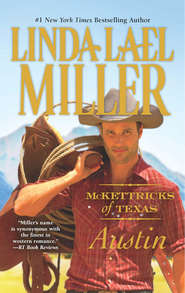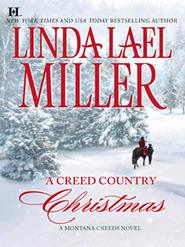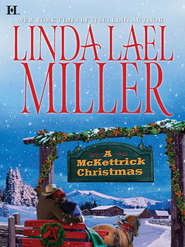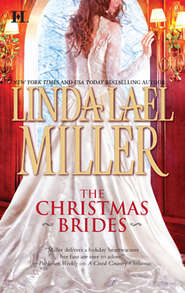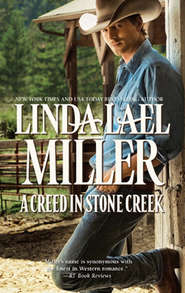По всем вопросам обращайтесь на: info@litportal.ru
(©) 2003-2025.
✖
McKettrick's Pride
Автор
Год написания книги
2019
Настройки чтения
Размер шрифта
Высота строк
Поля
Echo reattached the leash, then crouched to rub Avalon’s ears, trying to comfort her. The dog slouched against her, actually rested her head against Echo’s shoulder, and gave a deep, shuddery sigh.
“Did your people drive a motor home like that one?” Echo whispered sadly, almost expecting the dog to answer.
Avalon gave a soft, despairing whimper.
“We’ll find them,” Echo told her, even as her eyes filled at the prospect of parting with her wayfaring friend. “I promise, we’ll find them.”
That night, Avalon foreswore the air bed and slept with Echo, curled despondently against her side and chasing something in her dreams. Echo, meanwhile, lay awake, wondering about Rance McKettrick.
What made him tick?
And why did she give a damn?
“OF ALL THE DERN FOOL THINGS to give a seven-year-old child,” Cora scolded affectionately the next morning, as she made breakfast in the sunny kitchen of Rance’s house. She’d spent the night in a guest room, since the girls had been too exhausted from all the excitement to make the trip back to town. “She must have run over my toes half a dozen times.”
Rance, sipping fresh coffee and leaning against the counter, gazed out the window at the creek flowing by, shining in the sun. Keegan’s house, the first one on the place, loomed augustly on the other side of the stream. “I told Myrna to get a Barbie car,” he said, by way of explanation. He hadn’t actually remembered what he’d told Myrna, until he asked her at the party, but Cora didn’t need to know that.
He crossed to the window, squinting a little, trying to see if Keegan’s Jag was parked in its usual place. The homestead, a log structure like Rance’s own house, was old, and it didn’t have a garage.
“Did you happen to see Keegan drive off this morning?” he asked, and then could have kicked himself. Cora possessed uncanny abilities of perception—women’s intuition, she called it—and he wouldn’t be a damn bit surprised if she guessed what he was really worried about.
“It’s not my day to watch Keegan McKettrick,” Cora said. “But since Devon’s there, I imagine he’s probably at home. If he’s got a lick of sense, he’ll take a few days off, instead of putting in twelve hours at McKettrickCo like he usually does.”
Rance didn’t dare turn around and look at his mother-in-law. He was afraid she’d see something in his face if he did. Not that there was anything to see—he just didn’t want her misunderstanding his concern about where Keegan might have passed the night, that was all.
He was a little startled when Cora’s hand came to rest on his shoulder; he hadn’t heard her approaching. “That was a fine thing you did, Rance,” she said quietly. “Getting back here for Rianna’s party, I mean.”
He looked down at her, not used to her praise. Once, they’d been close, he and Cora, but Julie had been the link between them, and things had changed after she died. The girls might have bridged the gap; instead, they were cause for argument, most of the time.
“I shouldn’t have left in the first place,” he said, to himself as much as to Cora. “I don’t know what the hell I was thinking.”
Cora’s hand still rested against his shoulder. “Maeve and Rianna remind you of Julie,” she said gently. “It’s been five years, Rance. You need to let her go and concentrate on raising your daughters. Start seeing them for themselves.”
Rance’s throat closed. He set his coffee cup down on the wide sill of the window. Rafe McKettrick, his ancestor and Angus’s second son, had hewn that sill himself and hammered it into place. Rafe had had two daughters, too, with his wife, Emmeline. Rance wondered if he’d ever felt as confounded, raising girls, as he did.
Fortunately, before he had to say anything, Rianna and Maeve erupted into the kitchen like a couple of bullets.
“Can I drive my car all the way to town, Daddy?” Rianna demanded.
Rance turned, grinning down at his daughter, trying his best to see the child behind the overlay of Julie that always clouded his vision where Maeve and Rianna were concerned.
“No,” he said.
“It’s thirty miles to town, you dummy,” Maeve remarked.
“No name-calling,” Rance told his eldest daughter. The truth was, all of a sudden he saw two individuals standing there, in baby-doll pajamas and bare feet, with only a trace of Julie showing around their eyes.
“I’ll be careful,” Rianna said, “and I won’t speed. Cross my heart.”
Rance laughed. “Your rig tops out at about two miles an hour, kiddo,” he answered. “Take you a couple of days to get to Indian Rock, and your battery would die before you got to the main road.”
Rianna looked gravely disappointed. “Well, what’s the use of having a car if you can’t take it anywhere?”
“End of the driveway and back,” Rance decreed. “No farther.”
“Across the bridge to Uncle Keegan’s house?” Rianna tried. The kid had a future with the company, as a contract negotiator, if McKettrickCo didn’t go public in the meantime. The fight was still on where that decision was concerned. The meeting in San Antonio had gone on for the better part of three days, with nothing settled.
“No way,” Rance said.
Rianna plopped onto one of the benches lining the long table. It was a copy of the one across the creek, on the homestead. “I wanted to give Devon a ride,” she lamented.
“Devon can’t fit,” Maeve said. “It’s a baby car.”
“Leave your sister alone, Maeve,” Rance told his elder daughter.
Maeve subsided, but there was McKettrick thunder in her eyes.
“Babies don’t drive cars,” Rianna told Maeve.
“Enough,” Rance interceded.
“How am I supposed to show Echo that my car is just like hers?” Rianna persisted.
Rance closed his eyes, remembering how he’d gotten his back up the night before, when Echo had called his arrival by helicopter “impressive.” He’d been ultra touchy, stressed out because the meetings in San Antonio had done nothing but raise more trouble in the McKettrick ranks. He’d felt compelled to leave early so he could be home for Rianna’s party, and when the company jet landed in Flagstaff, there was a delay chartering the chopper. He’d been flat-out wrong to take those things out on Echo by snapping at her the way he had.
“Echo saw your stupid car last night,” Maeve pointed out.
“Maybe Avalon could fit,” Rianna speculated.
Rance sighed.
Cora stepped in. “Eat your breakfast, both of you.”
Rance gave her a grateful look.
“You, too,” she said.
He took his place at the head of the table—a seat he occupied all too infrequently—and let Cora serve him a plate mounded with fried potatoes, eggs and sausage links. He’d employed a variety of housekeepers and nannies over the years since Julie died, but none of them had lasted. Too much responsibility had fallen on Cora.
“Looks like a heart attack waiting to happen,” he said appreciatively, and dug into the food.
Cora laughed. “Well, that’s a fine how-do-you-do,” she replied. “I cook you a meal, and you accuse me of trying to kill you.”
Maeve’s eyes widened. Her lower lip wobbled and, suddenly, she looked a lot younger than her usual ten-going-on-forty. “You wouldn’t really have a heart attack, would you, Dad?” she asked.
Rance reached out, ruffled her hair. “No,” he said quietly. “I plan on living to be a hundred and causing you all kinds of trouble in my old age.”
Maeve relaxed visibly, and her eyes danced. For a moment, he saw Julie again. “Just keep in mind,” she said, “that I’ll have a say in picking out your nursing home.”






